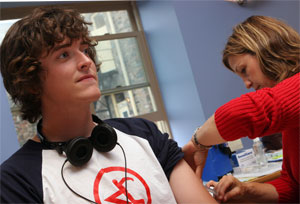 |
| A King's student gets a MMR shot at a free clinic held last fall. (Nick Pearce Photo) |
Nova Scotia’s Chief Public Health Officer Robert Strang is urging incoming university students to make sure their measles/mumps/rubella (MMR) vaccinations are up to date before arriving at school in September.
Students who know they have never had MMR vaccine should have two doses with at least 30 days between doses. Students who aren’t sure if they have had MMR vaccine only need a single dose.
In most provinces and territories, students can get a MMR vaccine from their doctor at no cost to them.
Last spring, Nova Scotia had several hundred cases of mumps that affected university-aged people in particular. This was mainly because many Nova Scotians born between 1970 and 1992 did not have the second dose of MMR vaccine, now administered routinely, and therefore were not fully protected.
According to the Public Health Agency of Canada, 1,284 mumps cases were reported nationally in 2007. The vast majority, or 1,159 cases, was associated with outbreaks in Nova Scotia, New Brunswick and Alberta. More than half occurred in persons aged 20 to 29 years, many of whom were college or university students.
In response to the outbreak, the provincial Department of Health Promotion and Protection launched a voluntary program to provide the MMR vaccine to all Nova Scotians attending a university or college—as well as to all students from outside of Nova Scotia attending school in Nova Scotia.
More than 1,000 students were vaccinated at the clinics held last fall at Dalhousie and the University of King’s College. Another 1,000 students who visited Dalhousie Health Services were also vaccinated. There hasn’t been a case of a student with the mumps at Dalhousie since last October.
Kim Plaxton, a family physician with Dalhousie Health Services, says most students coming to Dalhousie in September would have got their second MMR shot when they started primary school or got their second shot during clinics held at their high school last year.
“We’re in a much better situation than we were last year,” says Dr. Plaxton. “But international students may be one group who could benefit from a second MMR shot. Every country seems to do different things when it comes to immunization.”
A vaccine-preventable disease, mumps is an acute viral infection of the salivary glands. Taking anywhere from 12 to 25 days to develop, symptoms include fever, headache, muscle ache and swelling and tenderness of the salivary glands at the angle of the jaw. Infection occurs through direct contact with respiratory droplets from the nose or throat, through saliva, coughing, sneezing, sharing drinks, kissing or from contact with surfaces that have been contaminated with the mumps virus.
For most people, mumps is a fairly mild disease, but it can lead to meningitis, inflammation of the testicles or ovaries, inflammation of the pancreas and transient or permanent hearing loss.
